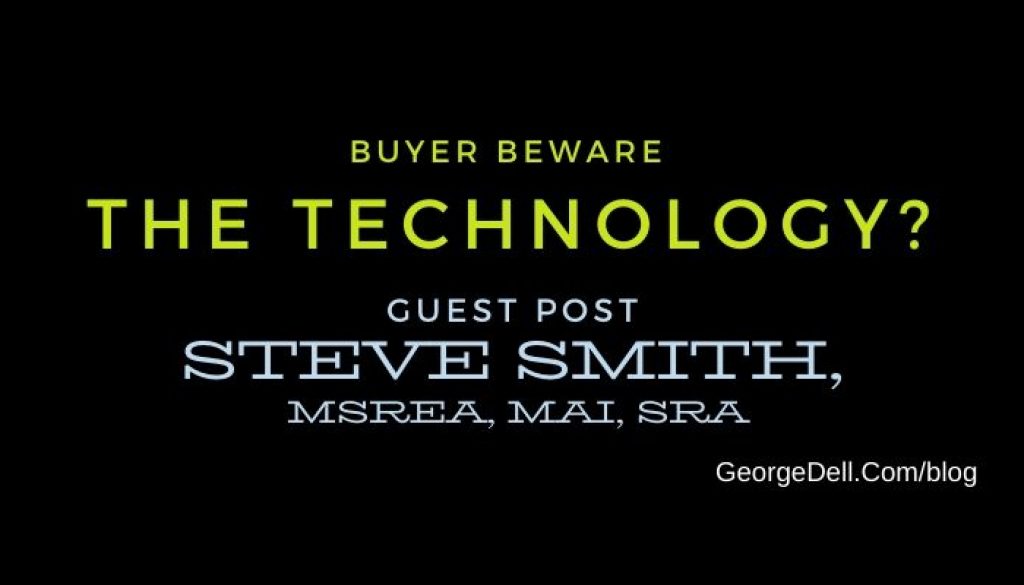Our guest poster this week is on technology, written by my long time friend and colleague, Steven R. Smith, MSREA, MAI, SRA. Steve has an MS in Real Estate Appraisal, BS in Real Estate Finance, MAI and SRA designations. Appraising since 1976, with prior experience in lending and sales. His Master’s thesis was on Real Estate Frauds, Mortgage Frauds and Appraisal Frauds. Steve works on civil and criminal cases as an expert witness and rebuttal witness. Cases range from casualty loss, eminent domain, partition, class action and professional liability. Steve is the founder and owner of the National Appraiser’s Forum, a free, moderated group for appraisers to bring their questions to consult with others to gain insight and information. To subscribe, go here: nationalappraisersforum-
The technology I remember as a kid was Dick Tracy in the comic strips.
He had a wrist radio! Later, agent Smart had a shoe phone! Not even believable back then, pure fantasy. Now we have wrist phones with computers inside.
The first incarnation of what was to become the computer was used in the 1890 Census in the US, a tabulating machine.
My first encounter with computers was in the ’60’s in college, and they were the size of a bus. Fast forward to 1980 and my first personal computer had a floppy drive, 8″ disks, no hard drive, CPM based OS. By 1981 we had moved up to a DOS based PC with a hard drive, 10MG. It cost $4,000. Today you can buy a PC with Terra-bytes of storage for under $1,000. Technology in the computer world is accelerating faster than Moore’s Law.
At the same time, loan production appraisals have long had a form. Tens of thousands of appraisers have made a living filling out the form. Now, the users of appraisal services are using advanced technology to marginalize their need for appraisers. After all 98% of the time they simply hit the Sales Price or higher. Who needs them on a Sale?
Well, what if the buyer is uninformed and not operating in their own best interest. What if the buyer has had their Hot Buttons pushed to get them to sign up for the purchase; and are silently waiting for the appraisal to come in to find out If it was worth it? ? ? (Gulp, OMG, no one told me, yikes).
When markets are hot, agents are really, really good at pushing hot buttons and getting buyers to bid full price or over bid.
In California, half the residential Purchase Agreement forms have a pre-printed “appraisal contingency” clause written in. How many times has a buyer, a member of the public the license law intended to protect, checked that box assuming the appraiser would take care of them, protect them from over paying?
The Mission Statement of the license board has to do with protecting the public. From who? The appraiser, that’s who.
I say these things now as the markets have cooled. Rising prices will no longer protect the sins of the appraiser.
Buyers do sue appraisers, even though they may never have actually seen the report. Investors too. Appraisers doing lender work are wide open due to Certification 23, which opened the door on privity to the entire Stream of Commerce that might come to rely on the valuation estimate.
Historically, as markets decrease in sales volumes and prices, professional liability cases increase.
My recommendation is that if appraising a sale, review the Purchase Agreement and see if the Appraisal Contingency has been checked. Then, know for sure that the Buyer is going to rely on the valuation, even though the report may not list them as an Intended User.
There have been legal cases where the buyer sued everyone, the agent, the loan officer, the appraiser, the review appraiser at the lender, and the underwriter. Don’t think anyone is going to come to the defense of the appraiser, quite the contrary.
Personally, in sale transactions, I prefer to work directly for the buyer, and do my valuation analysis before they make their offer. That way they are well informed. I don’t push hot buttons; I analyze to the ‘market value’ and stop there.
And, I have had situations where the buyer, once well informed, made a conscious decision to pay more for reasons personal to them. At least, I was not responsible for misleading them, but rather, informing them.
The next time you do a sale and it is not the result of analysis, you might ask for permission to speak to the buyer before you issue your report. By doing so, we can find out what market participants really think. It might be surprising.
We all have reputations. The license law was intended to protect the public. In a real estate transaction, that is the buyer. I want to understand what they know or don’t know, before issuing my report. And, I want to have a good reputation for being fair, auditable, verifiable, reliable. What if the buyer said “I simply do not want to over pay”, would we push the value to help make the deal work?
As technology eliminates more appraisers, there may be a niche to do work on the front end, before the Offer is made. How good would we all feel if we knew we were protecting the Buyer or the Consumer the license law intended us too?
The opinions here are solely those of the author, for discussion purposes.

November 20, 2019 @ 11:16 am
Appraiser’s please read Steve’s post carefully. In the last 90 days, I completed a review on a SALE. The sales price was $425,000. The appraiser desperately tried to support it. The review value came in at $290,000. This is the 2nd time this happened to me. Both were in high markets. The last one was in 2007. Sales price of $810,000. I appraised the home
at $510,000. Two realtors were trying to swindle a client with money. It happens, please watch your back!